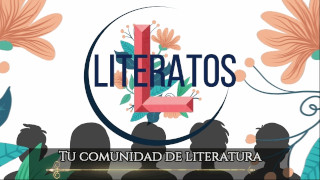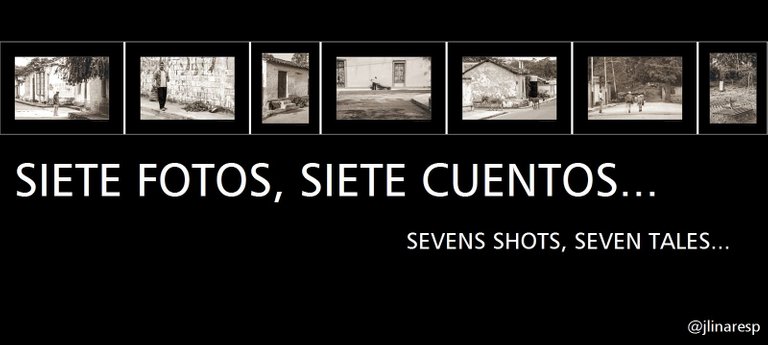
¿Y por qué siete?... Preguntó Don Marcos Pinto, mientras el tenue olor a humo de cigarro "Capa Negra" invadía toda la habitación.
And why seven? Don Marcos Pinto asked, while the faint smell of "Capa Negra" cigar smoke invaded the whole room.
-¡Yo que carajos voy a saber abuelo!... Contesté sin mirarlo.
-What the fuck do I know, grandfather? I answered without looking at him.
Escuché su sonrisa de siempre y de reojo le vi desvanecerse caminando hacia atrás, sin dar nunca la espalda y diciendo: "Dios te bendiga y te de buen descanso".
I heard his usual smile and out of the corner of my eye I saw him fade away walking backwards, never turning his back and saying: "God bless you and give you a good rest".
Mi abuelo Marcos murió, en 1976, cuando yo era un crío de apenas 5 años... Pero Mamá dice que comencé a verlo desde la mañana siguiente a su muerte, pues me desperté diciendo: "Mamá, abuelo vino anoche a verme y me dio su bendición"... ¡Pero resulta que estábamos a unos 180 kilómetros de distancia de la cama en donde un infarto fulminante la había sorprendido varias horas antes!.
My grandfather Marcos died, in 1976, when I was a boy of only 5 years old.... But Mom says that I began to see him the morning after his death, because I woke up saying: "Mom, Grandpa came to see me last night and gave me his blessing"... But it turned out that we were about 180 kilometers away from the bed where a fulminant heart attack had surprised her several hours before...
Desde entonces siempre "aparece por ahí"... Aún no entiendo el porqué de que eso suceda, pero después de 47 años viéndole aparecer y desaparecer sin previo aviso, ya me he acostumbrado.
Since then she always "pops up there".... I still don't understand why that happens, but after 47 years of seeing him appear and disappear without warning, I'm used to it.
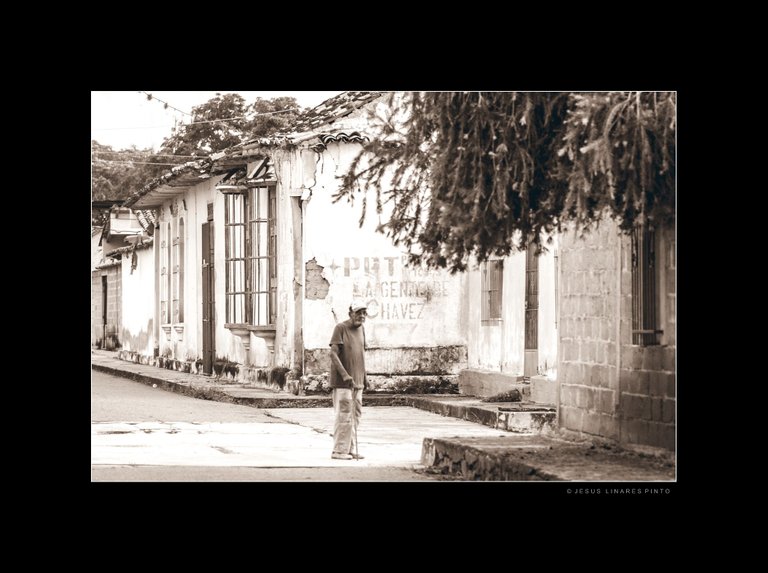
"Sócrates" / "Socrates"
Pasé por la esquina de la Avenida Carabodo, esa en donde las casas se están muriendo de mengua y olvidos, esa misma en donde Sócrates está casi siempre de pie, mirando sin mirar,como esperando un descanso que nunca llega o siempre está. Le hice una foto rápida, casi mezquina, como para no perder la costumbre. Pasé a su lado, le saludé y apenas contestó; así lo hace siempre... Después me fui caminando en dirección al centro del pueblo y me topé con Martín, quien estaba de pie en el zaguán de su casa y con el tufo a licor intenso rodeándolo, pero con la sonrisa de siempre pintada en su cara... Me preguntó: ¿De donde vienes por ahí? y le conteste: "Aquí, en lo de siempre, tomando fotos, ahorita le hice una a Sócrates, que está allá parado a dos cuadras"... Martín soltó una carcajada estridente y me dijo: "Tu si tienes vainas, Sócrates se murió en esa misma esquina dos meses atrás y tu le sigues tomando fotos".
I passed by the corner of Carabodo Avenue, the one where the houses are dying of decrepitude and oblivion, the same one where Socrates is almost always standing, looking without looking, as if waiting for a rest that never comes or is always there. I took a quick photo of him, almost mean, as if not to lose the habit. I passed by him, greeted him and he barely answered; he always does.... Then I walked towards the center of town and ran into Martin, who was standing in the hallway of his house and with the intense smell of liquor surrounding him, but with his usual smile painted on his face ... He asked me: "Where are you coming from? and I answered him: "Here, as usual, taking pictures, right now I took one of Socrates, who is standing two blocks away".... Martin let out a loud laugh and told me: "You've got some funny shit, Socrates died on that same corner two months ago and you're still taking pictures of him".
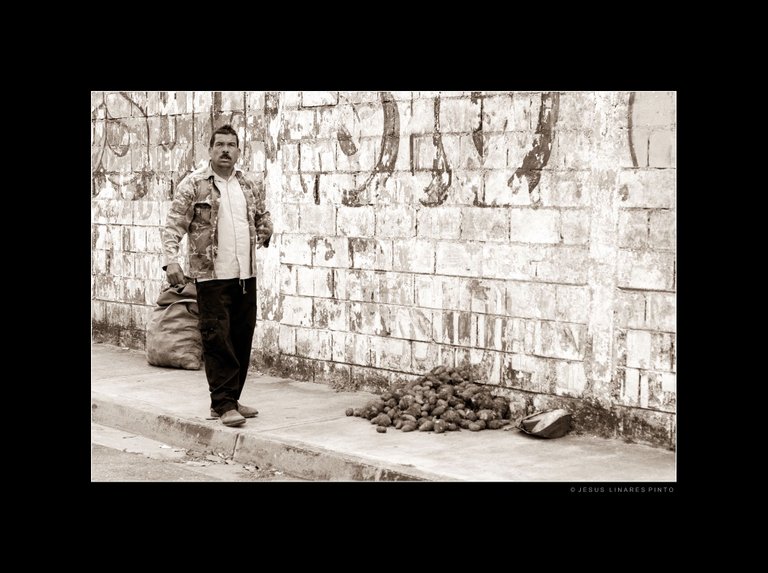
"Demetrio" / "Demetrio"
Me cuenta Demetrio que a él, a su Papá y a su hermano, 20 años atrás el gobierno le "regaló" unas tierras que "le quitaron" a una "gente rica"... En esas tierras sembraron y prosperaron y con eso la familia creció, aunque el viejo murió hace cinco años... Me cuenta también Demetrio, que ahora el mismo gobierno que les "regaló" sus tierras se las está quitando, porque (según Demetrio dice) ahora los hijos de aquella "gente rica" son amigos del gobierno... Mientras tanto Demetrio vende lo que siembra de calle en calle, esperando a que el mismo gobierno que le dio,ahora le quite.
Demetrio tells me that 20 years ago the government "gave" him, his father and his brother some land that was "taken" from "rich people".... On that land they sowed and prospered and with that the family grew, even though the old man died five years ago. Demetrio also tells me that now the same government that "gave" them their land is taking it away from them, because (according to Demetrio) now the children of those "rich people" are friends of the government... Meanwhile Demetrio sells what he sows from street to street, waiting for the same government that gave him, now takes it away.
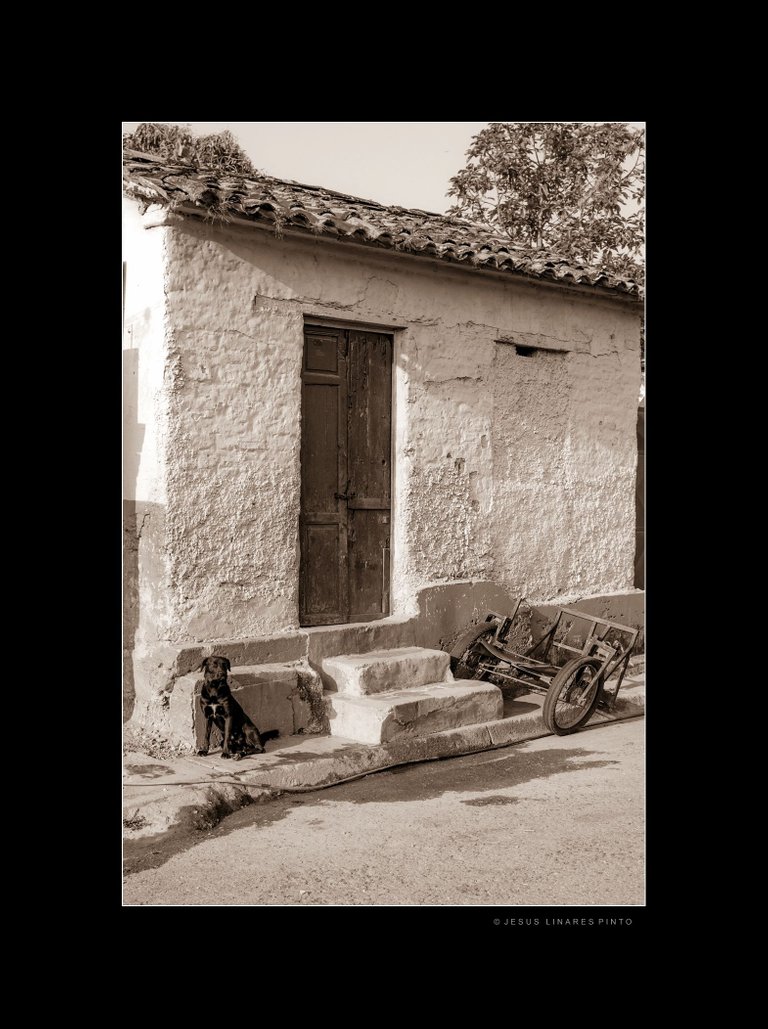
"Nerón y la carretilla de Guachi" / "Nero and Guachi's wheelbarrow"
Nerón llegó una noche de lluvia, que era pequeñito, negro azabache con una cruz blanca en el pecho... Dice Guachi, a mi no me crean, que rasguñaba la puerta con sus patas y lloraba, casi hablaba, mientras la lluvia arreciaba... Cuando Guachi abrió la puerta, el perrito entró, se acurrucó en un rincón y se durmió.... Desde entonces Nerón se despierta en las noches y "le echa un ojo" a la vieja carrucha de Guachi, porque esta no cabe por la única puerta de la diminuta casa. Por ahí solo caben Nerón y su amo Guachi a duras penas.
Nero arrived one rainy night, he was tiny, jet black with a white cross on his chest.... Guachi says, don't believe me, that he scratched the door with his paws and cried, almost talked, while the rain was pouring.... When Guachi opened the door, the little dog came in, curled up in a corner and fell asleep... .... Since then Nero wakes up at night and "keeps an eye" on Guachi's old stroller, because it doesn't fit through the only door of the tiny house. Only Nero and his master Guachi can barely fit through it.
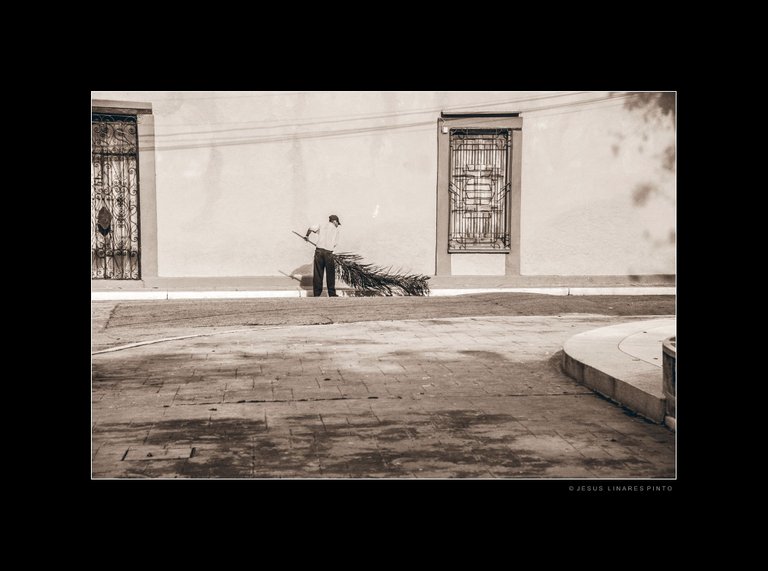
"Sorolo" / "Sorolo"
El día en el que a Sorolo le confirmaron que el trabajo de "Barrer la plaza del pueblo" era suyo, se sintió muy alegre y se fue a comentarlo con todos en su familia, pues el pobre llevaba muchos años sin un trabajo estable... Sin embargo, el lunes temprano, cuando llegó a las oficinas municipales y su jefe le entregó una "pequeña escoba de barrer casas" (tal como él le llama a las escobas que venden en las tiendas) casi de desarma de las risas y le dijo a su jefe: ¡Con esa escoba no terminaré de barrer antes de Navidad y estamos en Mayo!... Entonces, se fue al viejo patio de misia Trina, se encaramó en una palmera de 15 metros de alto y comenzó a cortar las hojas que han sido su "instrumento de trabajo" desde hace muchos años... ¡Y ya a las 8 AM nuestra plaza está barrida por Sorolo sin falta!.
The day when Sorolo was confirmed to have the job of "sweeping the town square", he was very happy and went to tell everyone in his family about it, since the poor man had been without a stable job for many years.... However, early Monday morning, when he arrived at the municipal offices and his boss handed him a "small broom to sweep houses" (as he calls the brooms they sell in stores) he almost laughed and said to his boss: "With that broom I won't finish sweeping before Christmas and it's May! So, he went to Ms.Trina's old courtyard, climbed a 50-foot tall palm tree and began to cut the leaves that have been his "work tool" for many years.... And already at 8 AM our square is swept by Sorolo without fail!.
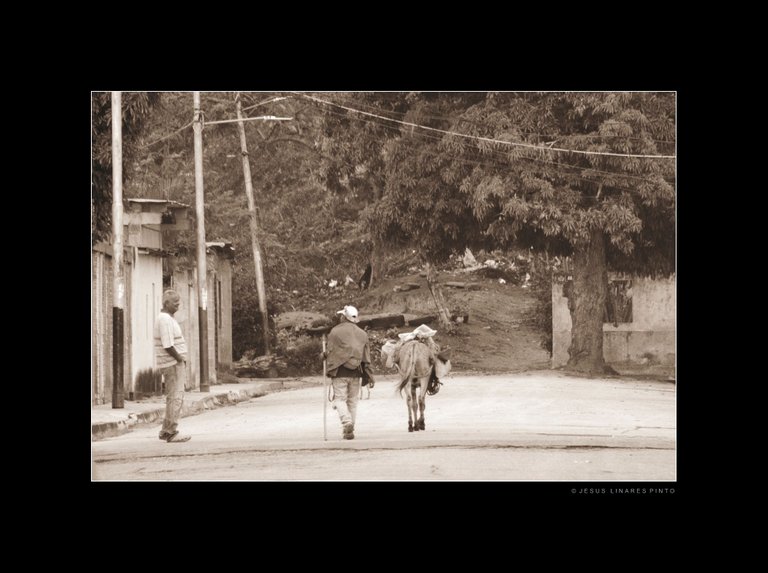
"Julián, Andrés y el burro" / "Julián, Andrés and the donkey"
¿A donde vas Andrés? -Pregunta Julián desde la esquina.
Where are you going Andres? Julián asks from the corner.
¡A llevar mi burro al monte caray! -Contesta Andrés sin detenerse.
To take my donkey to the mountain, wow! -Answers Andrés without stopping.
¿Y eso por qué, acaso en tu casa no es feliz? -Sigue Julián preguntando...
And why is that, perhaps in your house is not happy? -Julian keeps asking...
¡Sucede que anoche este condenado burro le mordió la mano a mi suegra cuando salió a lanzar la basura al pipote! - Grita Andrés aguantando la risa.
It so happens that last night this damned donkey bit my mother-in-law's hand when he went out to throw the garbage into the pipe! - Shouts Andrés holding back his laughter.
¿Y te lo llevas para dejarlo allá como castigo, cierto?... Sigue Julián.
And you take it to leave it there as punishment, right?... Julián continues.
¡No, por Dios!... ¡Lo llevo a pasear y pastar como merecido premio!... ¡Ya quisiera no digo morder a esa vieja!... Contesta Andrés antes de soltar la carcajada y agregar: "Me resultó mejor que el perro".
No, for God's sake!... I take him for a walk and graze as a well-deserved prize!... I would like to not say bite that old woman!... Andrés answers before laughing and adding: "It turned out better for me that the dog!".
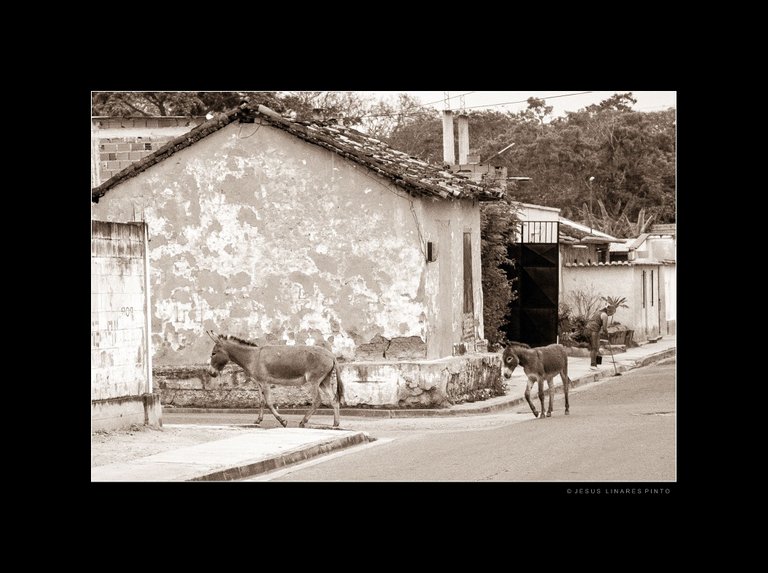
"Los burros de Don Chano" / "Don Chano's donkeys"
Y hablando de burros, por cierto... Les cuento que hace días deambulan dos burros por el pueblo... Se trata de un madre y de su cría aún pequeña. Caminan por las calles en la mañana, pastan en cualquier terreno baldío y hasta han aprendido a pedir agua en las tomas clandestinas del pueblo... ¡Todo un caso los burritos a los que la gente llama ahora "municipales"!.
And speaking about donkeys, by the way... I tell you that two donkeys have been wandering around the village for days... They are a mother and her still small calf. They walk through the streets in the morning, graze in any vacant lot and have even learned to ask for water in the town's clandestine taps... The donkeys that people now call "municipales" are quite a case!
Pero ayer apareció "Don Chano" por la ultima calle del pueblo, ordinario, polvoriento y escandaloso como él suele ser... Y apenas se topó con un vecino le dijo sin saludar antes: ¿Usted no ha visto a mis dos burros? Son una madre y su cría, se me fugaron hace un mes, no han vuelto para ponerlos a trabajar y no los encuentro... El vecino, consternado por la falta de modales del viejo Chano le contestó: He visto burros varias veces pero ¿Como sé yo que esos burros son suyos?... Chano lo mira de arriba abajo y exclama: ¡A carajo, mil disculpas, la próxima vez me traigo la carta de renuncia firmada por los burros!.
But yesterday "Don Chano" appeared on the last street of town, ordinary, dusty and scandalous as he usually is.... And as soon as he bumped into a neighbor he said without greeting him first: "Have you seen my two donkeys? They are a mother and her calf, they ran away from me a month ago, they have not returned to put them to work and I can't find them? The neighbor, dismayed by old Chano's lack of manners replied: "I have seen donkeys several times but how do I know that those donkeys are yours?... Chano looked him up and down and exclaimed: Fuck it, a thousand apologies, next time I'll bring the resignation letter signed by the donkeys!
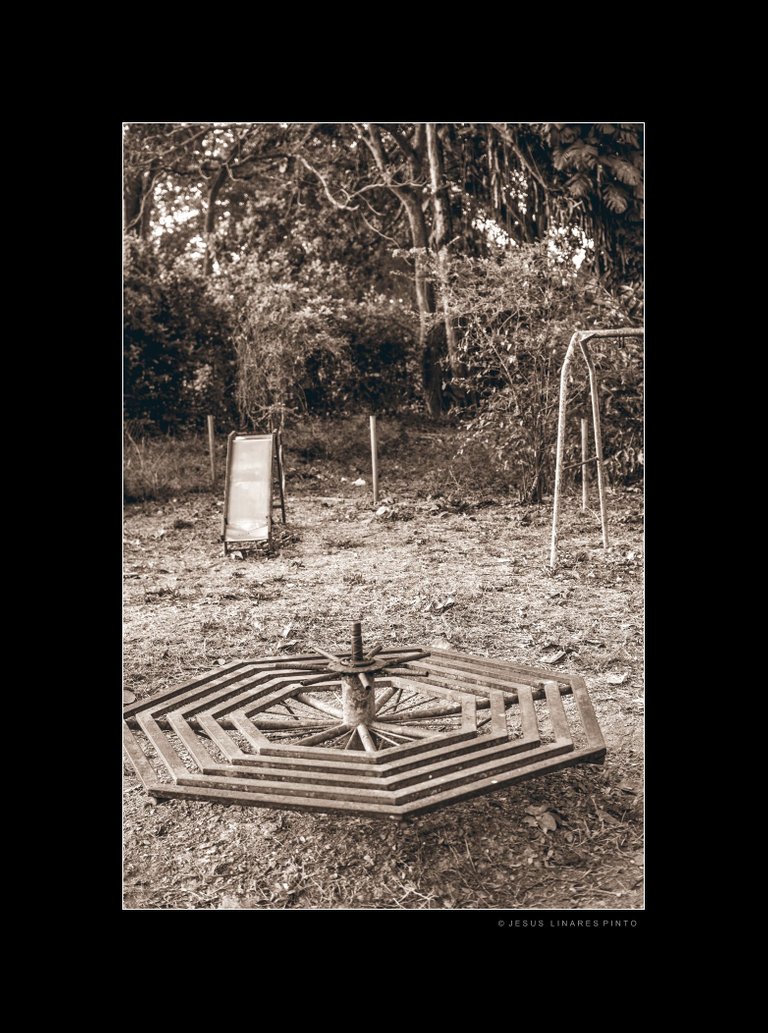
"El parque muerto" / "Dead park"
Desde que la miseria lo dejó morir de mengua, ya no vienen niños a jugar en el parque... Per cuentan los vecinos, que de noche, después de las once, cuando cantan las lechuzas... La vieja rueda gira sola y se escuchan columpios meciéndose y hasta algunos pasos y risas... Una vieja, la que mientan Luisa, dice que ella se asomó por la ventana y pudo ver a Vicentico, el muchachito de la esquina del tuerto, ese que murió hace poco cuando la tal "pandemia" se llevó una porción de gente... Dice Luisa, a mi no me crean, que Vicentico no juega solo, que hay otros carajitos con él, pero que ella no los conoce o que no se les logra ver bien el rostro... Dicen que tienen como pequeñas alas de luces tenues... Lo cierto, es que dice Luisa, que rien y cantan.
Since the misery left it to die of poverty, children no longer come to play in the park... But the neighbors say that at night, after eleven o'clock, when the owls sing... The old wheel turns alone and you can hear swings swinging and even some footsteps and laughter... An old woman, the one who the people call Luisa, says that she looked out of the window and could see Vicentico, the little boy from the one-eyed man's corner, the one who died recently when the "pandemic" took a lot of people... Luisa says, don't believe me, that Vicentico doesn't play alone, that there are other little boys with him, but she doesn't know them or can't see their faces.... They say that they have like little wings with dim lights.... The truth is, Luisa says, that they laugh and sing.
"We make photographs to understand what our lives mean to ourselves." - Ralph Hattersley.
"Hacemos fotografías para comprender lo que nuestras vidas significan para nosotros mismos." - Ralph Hattersley.

Cámara: Nikon D7000 | Objetivo: Sigma 18-200mm f3.5-6.3 II DC OS HSM
Montalbán, Carabobo, Venezuela.
